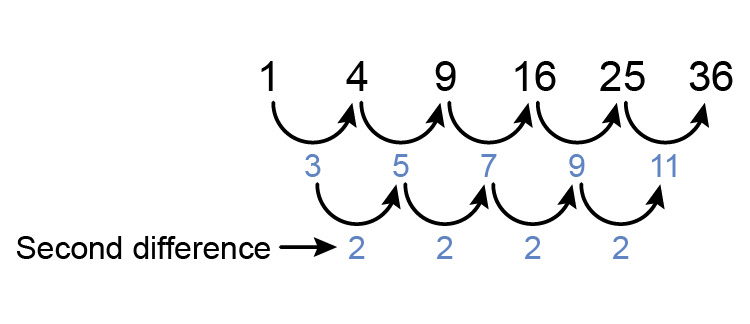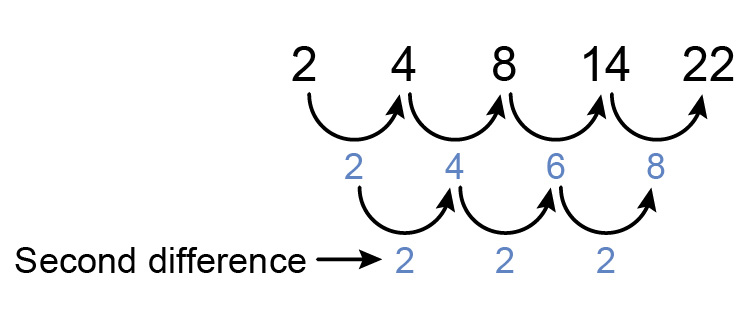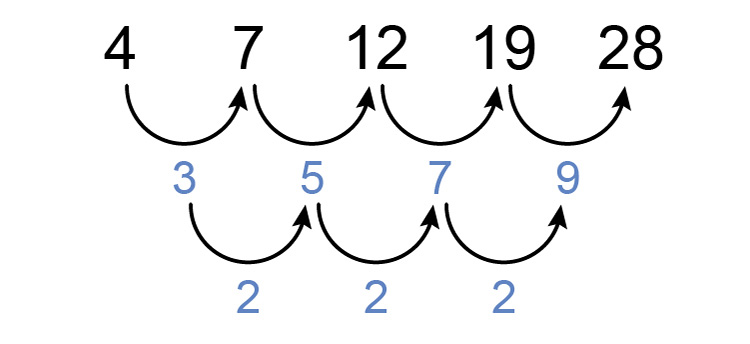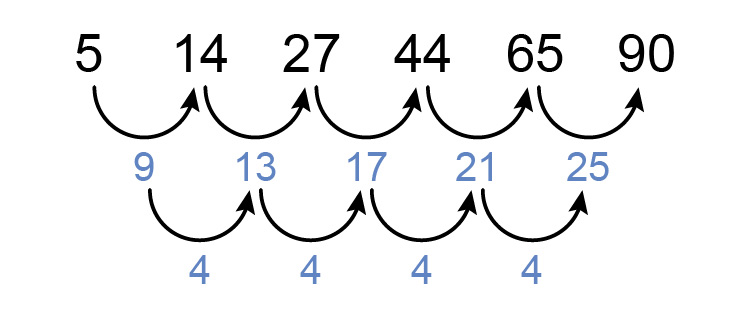Quadratic formula to find `n^(th)` term of a sequence easier method - consistent difference between difference
Method 2
This method is trickier to remember but less work to find an answer.
We know

and mathematicians also found that

Once you have found `a,\ b,\ &\ c` you can slot these figures in the following formula
`an^2+bn+c`
Example 1
We know the following sequence is a quadratic sequence but what is the formula for the `n^(th)` term using an easier method?

The 1st term `=a+b+c`
so `1=a+b+c`
The 2nd term `=4a+2b+c`
so `4=4a+2b+c`
and `a=(se\cond\ \ di\fference)/2`
`a=2/2=1`
Now we have
`1=a+b+c` .................... (1)
`4=4a+2b+c` ................ (2)
and `a=1`
therefore equation (1) becomes `1=1+b+c`
`1-1=b+c`
`-b=c`
therefore equation (2) becomes `4=4times1+2b-b`
`4-4=2b-b`
`0=2b-b`
`0=1b`
`b=0`
Now substitute `a=1` and `b=0` into equation (1)
`1=a+b+c`
`1=1+0+c`
`c=1-1=0`
Summary `a=1` `b=0` and `c=0`
therefore the formula for the `n^(th)` term in this sequence is
`an^2+bn+c`
or `1n^2+0n+0`
which is `n^2`
Now we need to check the formula is correct.
Try different values of `n` in the formula `n^2`
If `n=1` term `=1^2=1`
If `n=2` term `=2^2=4`
If `n=3` term `=3^2=9`
If `n=4` term `=4^2=16`
This is correct
Answer `=n^2`
Example 2
We know the following sequence is a quadratic sequence but what is the formula for the `n^(th)` term using an easier method?

The 1st term `=a+b+c`
so `2=a+b+c`
The 2nd term `=4a+2b+c`
so `4=4a+2b+c`
and `a=(se\cond\ \ di\fference)/2`
`a=2/2=1`
Now we have
`2=a+b+c` .................... (1)
`4=4a+2b+c` ................ (2)
and `a=1`
therefore equation (1) becomes `2=1+b+c`
`1=b+c`........... (i)
therefore equation (2) becomes `4=4times1+2b+c`
`4=4+2b+c`
`4-4=2b+c`
`0=2b+c` ......... (ii)
Now we have two simultaneous equations:
`1=b+c` ........... (i)
`0=2b+c` ......... (ii)
From (i) we get `b=1-c`
Substitute that into (ii) we get
`0=2(1-c)+c`
`0=2-2c+c`
`0=2-1c`
`-2=-c`
`c=2`
Now substitute `c=2` into (i)
`1=b+2`
`b=1-2`
`b=-1`
Summary `a=1` `b=-1` and `c=2`
therefore the formula for the `n^(th)` term in this sequence is
`an^2+bn+c`
or `1n^2+(-1)n+2`
which is `n^2-n+2`
Now we need to check the formula is correct.
Try different values of `n` in the formula `n^2-n+2`
If `n=1` term `=1^2-1+2=2`
If `n=2` term `=2^2-2+2=4-2+2=4`
If `n=3` term `=3^2-3+2=9-3+2=8`
If `n=4` term `=4^2-4+2=16-4+2=14`
This is correct
Example 3
We know the following sequence is a quadratic sequence but what is the formula for the `n^(th)` term using an easier method?

The 1st term `=a+b+c`
so `4=a+b+c`
The 2nd term `=4a+2b+c`
so `7=4a+2b+c`
and `a=(se\cond\ \ di\fference)/2`
`a=2/2=1`
Now we have
`4=a+b+c` ................... (1)
`7=4a+2b+c` .............. (2)
and `a=1`
therefore equation (1) becomes `4=1+b+c`
`3=b+c`........... (i)
therefore equation (2) becomes `7=4times1+2b+c`
`7=4+2b+c`
`7-4=2b+c`
`3=2b+c` ......... (ii)
Now we have two simultaneous equations:
`3=b+c` ........... (i)
`3=2b+c` ......... (ii)
From (i) we get `b=3-c`
Substitute that into (ii) we get
`3=2(3-c)+c`
`3=6-2c+c`
`3-6=-2c+c`
`-3=-c`
`c=-3/-1=3`
Now substitute `c=3` into (i)
`3=b+3`
`b=3-3`
`b=0`
Summary `a=1` `b=0` and `c=3`
therefore the formula for the `n^(th)` term in this sequence is
`an^2+bn+c`
or `1n^2+0n+3`
which is `n^2+3`
Now we need to check the formula is correct.
Try different values of `n` in the formula `n^2+3`
If `n=1` term `=1^2+3=4`
If `n=2` term `=2^2+3=4+3=7`
If `n=3` term `=3^2+3=9+3=12`
If `n=4` term `=4^2+3=16+3=19`
This is correct
Answer `n^2+3`
Example 4
We know the following sequence is a quadratic sequence but what is the formula for the `n^(th)` term using an easier method?

The 1st term `=a+b+c`
so `5=a+b+c`
The 2nd term `=4a+2b+c`
so `14=4a+2b+c`
and `a=(se\cond\ \ di\fference)/2`
`a=4/2=2`
Now we have
`5=a+b+c` .................... (1)
`14=4a+2b+c` ................ (2)
and `a=2`
therefore equation (1) becomes `5=2+b+c`
`3=b+c`........... (i)
therefore equation (2) becomes `14=4times2+2b+c`
`14=8+2b+c`
`6=2b+c` ......... (ii)
Now we have two simultaneous equations:
`3=b+c` ........... (i)
`6=2b+c` ......... (ii)
From (i) we get `b=3-c`
Substitute that into (ii) we get
`6=2(3-c)+c`
`6=6-2c+c`
`6-6=-2c+c`
`0=-c`
`c=0`
Now substitute `c=0` into (i)
`3=b+c`
`3=b+0`
`b=3`
Summary `a=2` `b=3` and `c=0`
therefore the formula for the `n^(th)` term in this sequence is
`an^2+bn+c`
or `2n^2+3n+0`
which is `2n^2+3n`
Now we need to check the formula is correct.
Try different values of `n` in the formula `2n^2+3n`
If `n=1` term `=2times1^2+3times1=2+3=5`
If `n=2` term `=2times2^2+3times2=8+6=14`
If `n=3` term `=2times3^2+3times3=18+9=27`
If `n=4` term `=2times4^2+3times4=32+12=44`
This is correct
Answer `2n^2+3n`




